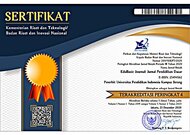The Role of Family, Education, and Cultural Context in Shaping Ethical Development among Nigerian Children: Challenges and Opportunities
Abstract
Keywords
Full Text:
PDFReferences
Abbate, C. S., Misuraca, R., Roccella, M., Parisi, L., Vetri, L., & Miceli, S. (2022). The role of guilt and empathy on prosocial behavior. Behavioral Sciences, 12(3), 64.
Adamu, S., & Dikko, S. U. (2017). The influence of family socio-economic status on the academic achievement of secondary school students in computer studies in Bauchi metropolis of Bauchi State, Nigeria. IMPACT: International Journal of Research in Humanities, Arts and Literature, 5(7), 123–142.
Adeoye, M. A., Nurjanah, R. L., Widiana, I. W., & Prastikawati, E. F. (2024). Transforming Nigeria’s education: Insights from Indonesia’s policy reinforcement. Mimbar Ilmu, 29(3), 451–459.
Adewusi, O. E.,Al Hamad, N. M., Adeleke, I. J., Nwankwo, U. C., & Nwokocha, G. C. (2023). Socio-economic disparities in early childhood education: A review of evidence from Nigeria and the UK. Social Values and Society, 5(1) 30–36.
Alaye, A., & Ogunbanwo, O. (2024). Poverty and inequality: Contemporary issues in Nigerian fourth republic. Acta Universitatis Danubius: Juridica, 20(3), 146–166.
Akinwale, G., & Ojakorotu, V. (2024). Embracing Yoruba folktales as a tool for moral development in children. Journal of Mother-Tongue Biblical Hermeneutics and Theology, 6(5), 54–67.
Azuakor, P. O. (2017). Nigeria highly religious but highly immoral, need for authentic moral education. Journal of Moral Education in Africa, 3(1), 216–233.
Bamgboye, E. A., Odusote, T., Olusanmi, I., Nwosu, J., Phillips–Ononye, T., Akpa, O. M., … Ladipo, O. A. (2017). School absenteeism among orphans and vulnerable children in Lagos State, Nigeria: A situational analysis. Vulnerable Children and Youth Studies, 12(3), 264–276.
Carlo, G., Chavez, F. L. C., & López-Mora, C. (2023). Prosocial behaviors in adolescence. In T. Malti & M. Davidov (Eds.), The Cambridge Handbook of Prosociality: Development, Mechanisms, Promotion (pp. 163–188). Cambridge University Press.
Comfort, O., David, I., & Moses, U. U. (2013). Addressing the insecurity challenge in Nigeria: The imperative of moral values and virtue ethics. Global Journal of Human Social Science Political Science, 13(2), 1–12.
Decety, J., & Cowell, J. M. (2014). The complex relation between morality and empathy. Trends in Cognitive Sciences, 18(7), 337–339.
Enweonwu, O. A., Ugwu, H. I., Eze, U. A., & Okafor, U. N. (2023). Religion as the matrix of Nigerian culture. International Journal of Advances in Engineering and Management (IJAEM), 5(2), 304–309.
Ferguson, N., Willis, C. S., & Tilley, A. (2001). Moral reasoning among Nigerian and northern Irish children: A cross-cultural comparison using the sociomoral reflection measure-short form. IFE Psychologia: An International Journal, 9(2), 1–6.
Gbadeyan, B. T., & Bayrakktar, Ü., A. (2023). Influence of social media on the behavioral formation of digital natives: A moderation approach. Journal of Law and Sustainable Development, 11(10), e1334
Gibbs, J. C. (2019). Moral Development and Reality: Beyond the Theories of Kohlberg, Hoffman, and Haidt. Oxford University Press.
Go, J. (2024). Parenting experiences and marital communication. Korean Journal of Family Welfare, 29(4), 733–754.
Govrin, A. (2014). The ABC of moral development: an attachment approach to moral judgment. Frontiers in Psychology, 5(6), 1–15.
Gungordu, N., Nabizadehchianeh, G., O’Connor, E., Ma, W., & Walker, D. I. (2023). Moral reasoning development: norms for Defining Issue Test-2 (DIT2). Ethics & Behavior, 34(4), 246–263.
Ishtiyaq, S., Tyagi, S., Pandey, A. S., Kumari, J., Srivastava, H. K., & Chauhan, R. (2024). Relationship between empathy and prosocial behavior. International Journal for Multidisciplinary Research, 6(6), 1–11.
Jiao, L., Kou, Y. & Xu, Y. (2025). Exploring the relationship between parental styles and good personality: A network analysis. Current Psychology, 44(4), 1–15.
Jung, H., Seo, E., Han, E., Henderson, M. D., & Patall, E. A. (2020). Prosocial modeling: A meta-analytic review and synthesis. Psychological Bulletin, 146(8), 635–663.
Kanu, I. A., & Ndubisi, E. J. O. (2017). Religious and moral education in Nigeria a complementing search for development. Journal of Moral Education in Africa, 3(1), 1–11.
Karmakar, R. (2017). The impact of perception of consistency and inconsistency in parenting style on pro-social motives of adolescents. Social psychology and society, 8(2), 101–115.
Keelson, S. A., Addo, J. O., & Dodor, A. (2024). The influence of lecturer non-verbal cues on student perceptions of teaching quality: the role of gender and age. Cogent Education, 11(1), 2325788.
Krettenauer, T., & Hertz, S. (2015). What develops in moral identities? A critical review. Human Development, 58(3), 137–153.
Killen, M., & Dahl, A. (2021). Moral reasoning enables developmental and Societal change. Perspectives on Psychological Science, 16(6), 1209–1225.
Li, W., He, Q.-F., Lan, J.-Z., Rehman, E.-U., Ge, M.-W., Shen, L.-T., Hu, F.-H., Jia, Y.-J., & Chen, H.-L. (2024). Empathy as a mediator of the relation between peer influence and prosocial behavior in adolescence: A meta-analysis. Journal of Youth and Adolescence, 54, 682–703.
Liman, M. A., Idriss, I. D., Alkali, M. A., & Abdullahi, Y. M. (2020). Child poverty in Nigeria: Causes and consequenses. International Journal for Studies on Children, Women, Elderly and Disabled, 11(1), 66–75.
Longo, V., Saadati, N., & Karakus, M. (2024). Exploring the role of extended family in child rearing practices across different cultures. Journal of Psychosociological Research in Family and Culture, 2(4), 4–12.
Maduelosi, N. J., & Ezuluofor, M. (2022). Children’s moral development in Nigeria: The parents, the teachers and the church. British Journal of Multidisciplinary and Advanced Studies, 3(1), 7–14.
Musa, W., & Idris, A. (2019). Youth empowerment program in Nigeria: A strategy for poverty alleviation and national development. Journal of Public Value and Administration Insights, 2(3), 12–14.
Mutu, P. (2023). Leveraging technology to deliver basic education to children in conflict areas of Northern Nigeria. African Human Rights Law Journal, 23(1), 182–204.
Nwanmuoh, E. E., Dibua, E. C., Friday, E. C. (2024). Implication of extended family culture in african nations on youth development: Evidence from Nigeria. International Journal of Public Administration and Management Research, 10(2), 82–89.
Nwogu, R. O., & Amemtenaan, C. P. (2023). Educational management and application of character in organisational leadership in secondary schools in Rivers State. Journal of Education in Developing Areas, 31(2), 54–61.
Nwoke, M. B. (2013). Influence of cultural value system and home on child-rearing practices in the contemporary Nigerian society. Open Journal of Philosophy, 3(1), 200–206.
Obiageli, U. E., & Nasiru, O. I. (2021). Relationship between peer-group influence and moral activities among in school adolescents in Kwara State. Forum Ilmu Sosial, 48(2), 160–168.
Obimakinde, A. M., Omigbodun, O., Adejumo, O., Adedokun, B., (2019). Parenting styles and socio-demographic dynamics associated with mental health of in-school adolescents in Ibadan, South-West Nigeria. Journal Child Adolescent Mental Health, 31(2), 109–124.
Odimegwu, C., Somefun, O. D., & Akinyemi, J. (2017). Gender differences in the effect of family structure on educational outcomes among Nigerian youth. SAGE Open, 7(4), 1–11.
Ofoha, D., & Ogidan, R. (2020). Punitive violence against children: A psychoeducational parenting program to reduce harsh disciplining practices and child beating in the home. International Journal of Psychological Research, 13(2), 89–98.
Ogbujah, C. (2014). African cultural values and inter-communal relations: The case with Nigeria. Developing Country Studies, 4(20), 208–217.
Ogedegbe, B. G., & Ikhidero, S. I. (2024). Nigerian youths and moral disruption in a changing world. Benin Journal of Religious and Society, 6(2), 15–28.
Okunlola, J. O. (2024). Unmasking the unseen in examination malpractices in high schools: A phenomenological study of quality assurance leaders’ lived experiences in public examinations. Journal for Educators, Teachers and Trainers, 15(3), 17–31.
Onaolapo, A. A., & Makhasane, S. D. (2024). Cultural significance of elderly guidance in shaping learner discipline management: A case of two secondary schools in Nigeria. Interdisciplinary Journal of Sociality Studies, 4, 1–13.
Onuorah, C. P., & Ufodiama, C. M. (2024). Balancing rights and responsibilities: unveiling the moral compass of Nigerian citizens. Journal of Liberal Studies, 19(1), 4–17.
Olabiyi, K. A. (2021). Child's well-being and parents' employment status in Nigeria. African Journal of Economic and Sustainable Development (AJESD), 8(1), 74–89.
Otubah, G. I. (2024). Religion and development in Nigeria. Ohazurume: Unizik Journal of Culture and Civilization, 3(1), 67–82.
Oyinlade, E. O. (2024). Technological culture and the challenge of erosion of Yorùbá moral values. African Journal of Culture, History, Religion and Traditions, 7(3), 1–9.
Paz, Y., Davidov, M., Orlitsky, T., Hayut, M., Roth-Hanania, R., & Zahn-Waxler, C. (2023). Prosocial behavior in toddlerhood and early childhood: Consistency across subtypes and over time. Frontiers in Psychology, 14, 950160.
Prada-Mateus, M., Obando, D., Sandoval-Reyes, J., Mejía-Lozano, M. A., & Hill, J. (2024). The role of parental involvement in the development of prosocial behavior in young children: An evolutionary model among Colombian families. Child Psychiatry & Human Development, 29, 39470837.
Roman, N. V., Davids, E. L., Moyo, A., Schilder, L., Lacante, M., & Lens, W. (2015) Parenting styles and psychological needs influences on adolescent life goals and aspirations in a South African setting. Journal of Psychology in Africa, 25(4), 305–312.
Saadu, U. T. (2023). Influence of parenting styles on moral skills acquisition of primary school pupils: Community service perspective. ASEAN Journal of Community Service and Education, 2(2) 105–116.
de Santis, A. J. (2020). Kohlberg’s moral development theory and evolutionary morality model on views of homosexuality. Human Ethology, 35, 106–121.
Saluun, P. W., & Timin, L. A. (2020). Religious ethical values: A Sine Qua Non for a developed Nigerian nation. Saudi Journal of Humanities and Social Sciences, 5(1), 17–20.
Simeon, N. A. (2024). Moral education and the role of religion in Nigeria. International Journal of Humanities, Literature and Art Research, 6(6), 167–176.
Toor, S. R., & Ofori, G. (2009). Ethical leadership: Examining the relationships with full range leadership model, employee outcomes, and organizational culture. Journal of Bussines Ethics, 90, 533–547.
Udom, I. D., & Okolie, U. C. (2022). Ethno-religious conflicts in Nigeria: A threat to the quest for national integration. The Indonesian Journal of International Clinical Legal Education, 4(1), 61–88.
Vogt, L. A. (2003). Empathy and moral development: Implications for caring and justice. Canadian Child and Adolescent Psychiatry Review, 12(2), 46–47.
Woolrych, T., Eady, M. J., & Green, C. A. (2024). Authentic empathy: A cultural basis for the development of empathy in children. Journal of Humanistic Psychology, 64(5), 954–973.
DOI: https://doi.org/10.17509/ebj.v7i1.80047
Refbacks
- There are currently no refbacks.
Copyright (c) 2025 Universitas Pendidikan Indonesia
This work is licensed under a Creative Commons Attribution 4.0 International License.
This journal is indexed by




.png)




.png)
1.png)


1.png)

.png)